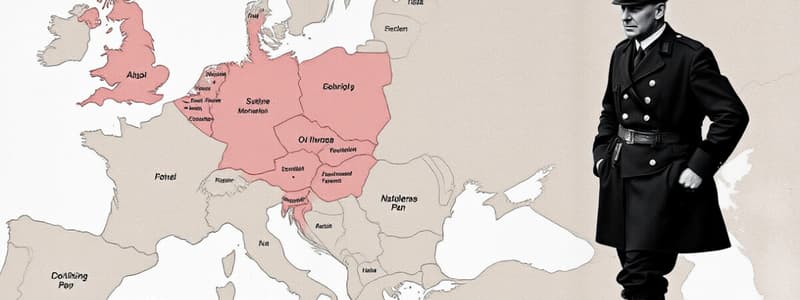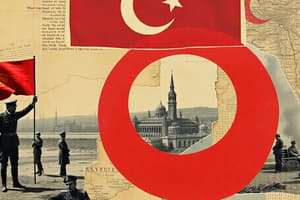Podcast
Questions and Answers
Why did Russia send troops to the border of Austria-Hungary in 1914?
Why did Russia send troops to the border of Austria-Hungary in 1914?
- Austria-Hungary needed help resisting a German invasion.
- Austria-Hungary was sending its people to live in Russia.
- Austria-Hungary was threatening to invade Russia.
- Austria-Hungary had invaded Serbia, and Russia was in an alliance with Serbia. (correct)
Which of the following describes the most important effect the tank had on World War I?
Which of the following describes the most important effect the tank had on World War I?
- The tank caused the war to last longer by killing so many soldiers.
- The tank increased the use of trench warfare in World War I.
- The tank ended the use of trench warfare for defense. (correct)
- The tank proved to be ineffective against bombs and guns.
How did the Spanish-American War affect US power in Asia?
How did the Spanish-American War affect US power in Asia?
- The war created opposition to the US in many Asian countries.
- The war with the Filipino rebels reduced US influence in Asia.
- The war had little effect on US power in Asia.
- The war made the US an important power in Asia. (correct)
Which sentence best describes the influence of alliances on the start of World War I?
Which sentence best describes the influence of alliances on the start of World War I?
What message did the Roosevelt Corollary send to the rest of the world?
What message did the Roosevelt Corollary send to the rest of the world?
Which factor helped shift American opinion away from neutrality during World War I?
Which factor helped shift American opinion away from neutrality during World War I?
Which of the following headlines would be the best example of the yellow journalism of the late 1800s?
Which of the following headlines would be the best example of the yellow journalism of the late 1800s?
Why did the United States establish the Open Door policy?
Why did the United States establish the Open Door policy?
When Perry returned to Japan in 1854, why did he bring more ships than he had in 1853?
When Perry returned to Japan in 1854, why did he bring more ships than he had in 1853?
The main reason the German government signed the Treaty of Versailles was that
The main reason the German government signed the Treaty of Versailles was that
How did new scientific knowledge help the building of the Panama Canal?
How did new scientific knowledge help the building of the Panama Canal?
In the Fourteen Points, Woodrow Wilson advocated for diplomacy over violence by seeking to prohibit
In the Fourteen Points, Woodrow Wilson advocated for diplomacy over violence by seeking to prohibit
Flashcards are hidden until you start studying
Study Notes
Russia and Austria-Hungary
- Russia sent troops to Austria-Hungary's border in 1914 due to an alliance with Serbia after Austria-Hungary invaded Serbia.
Tanks in World War I
- The introduction of tanks ended trench warfare as a defensive strategy, changing the dynamics of battles.
Spanish-American War Impact
- The Spanish-American War established the United States as a significant power in Asia, enhancing its influence in the region.
Impact of Alliances on World War I
- Extensive alliances among European nations resulted in a domino effect, where the involvement of two countries in war led to widespread participation from allied nations.
Roosevelt Corollary's Message
- The Roosevelt Corollary signaled that the US was taking responsibility for the Western Hemisphere, indicating a stance against other nations' involvement in the region.
Shift from Neutrality in World War I
- Strong cultural ties to Great Britain played a crucial role in shifting American public opinion away from neutrality during World War I.
Yellow Journalism in the Late 1800s
- The headline "Spain Starves Innocent Cubans" exemplifies yellow journalism, which sensationalized news to provoke public outrage.
Open Door Policy
- The US established the Open Door policy to ensure access to trade and maintain influence in China amidst growing imperial competition.
Commodore Perry's Return to Japan
- In 1854, Commodore Perry brought more ships to Japan to persuade the Japanese government to engage in negotiations.
Treaty of Versailles and Germany
- Germany signed the Treaty of Versailles primarily due to fears of potential military retaliation from Allied forces.
Building of the Panama Canal
- Advances in scientific knowledge, particularly in medicine, reduced the incidence of malaria and yellow fever among workers, facilitating the construction of the Panama Canal.
Wilson's Fourteen Points and Diplomacy
- Woodrow Wilson's Fourteen Points emphasized the importance of transparency in international relations by advocating for the prohibition of secret agreements between nations.
Studying That Suits You
Use AI to generate personalized quizzes and flashcards to suit your learning preferences.



